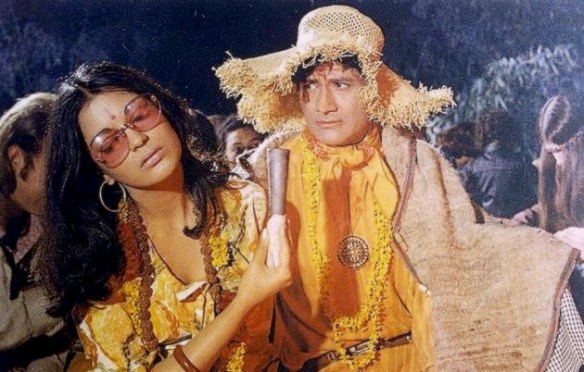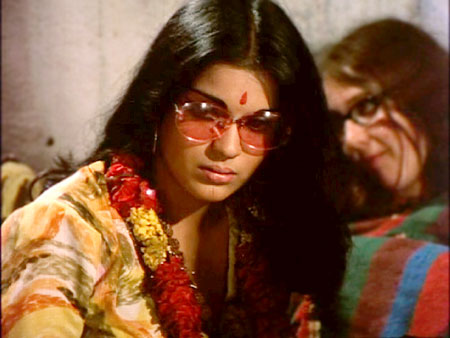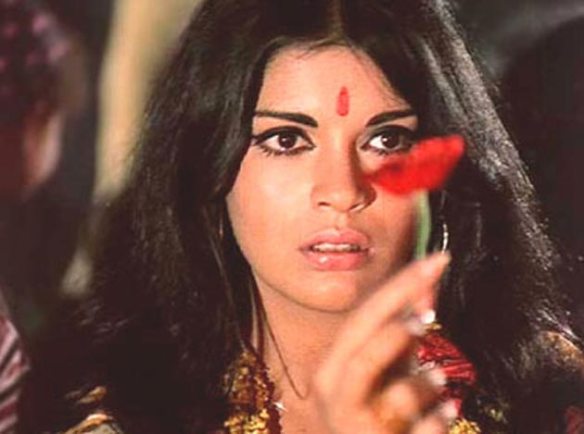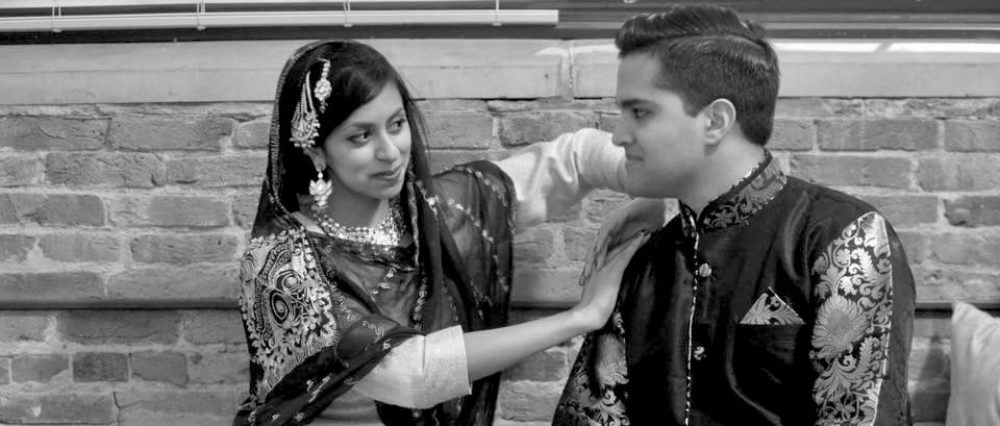
Zeenat Aman becomes shamelessly intoxicated in front of her brother Dev Anand in Hare Rama Hare Krishna (1971). More importantly, can someone please burn that hideous floppy straw hat?
Our next lyrics and English translation is the epitome of youthful rebellion and psychadelic glamour: “Dum Maro Dum” from Dev Anand’s 1971 Hare Rama Hare Krishna. The translation could not have come at a more appropriate time–as many of you know, as of 2 weeks ago, medical marijuana is now legalized in Massachusetts. So to all the Harvard seniors getting ready to graduate in a few months, this song is for you! When people think of Asha Bhonsle at her craziest, “Dum Maro Dum” is often the song that comes immediately to mind. It’s seductive, eccentric, and exhibits her full range from those bizarre, unexpected high notes to the fabulous embodiment of character as only Asha knew how. It’s one of incomparable music director R.D. Burman’s greatest works for the ground he broke–putting illicit drugs and societal defiance to the forefront in a youth-targeted song that was so instantly catchy no one could brush it off. Let’s face it, with this song, Zeenat may represent everything we don’t want in our loved ones, but God, does she make it look appealing.

Gorgeous Zeenat Aman sports a pair of show-stopping 70s shades as a drug addict in Hare Rama Hare Krishna (1971).
Shot in one of Dev Anand’s favorite locations, Kathmandu (remember Jewel Thief, anyone?), Hare Rama Hare Krishna is a politically-driven film against the subversive hippie culture that our hero believes to be distorting the true message of the Hindu ideals it pretends to preach. Dev Anand hunts down his long-lost sister in such a hippie camp and tries to extricate her with tragic results. The film delivers a powerful message without feeling like Manoj Kumar-eqsue patriotic propaganda. I really applaud Dev Anand for making such a bold film that critiques a subject so ignored by his contemporaries and so popular among the masses who bought into it–with a delightfully satirical name like Hare Rama Hare Krishna, the film was a risk and it paid off.
So enjoy our English translation and lyrics to “Dum Maro Dum” below! Follow along with the video and let us know your thoughts on this controversial smash hit in the comments! You know how Zeenat starts the song with a little “Hush!” just before the music starts? I can’t exactly explain why, but I always feel really awkward when I hear it.
Dum Maro Dum Lyrics and Translation
Dam maaro dam miT jaaye gham
Take another hit, all your worries will disappear
Bolo subah shaam hare krishna hare raam
From morning until night sing, “Hare Krishna Hare Ram!”
Duniyaa ne hum ko diyaa kyaa?
What has the world given us?
Duniyaa se hum ne liyaa kyaa?
What have we taken from the world?
Hum sab kii parwaa kare.N kyo.N?
Why should we worry about anyone?
Sab ne humaaraa kiyaa kyaa?
What has anyone does for us?
Dam maaro dam miT jaaye gham…
Chaahe jiye.Nge, mare.Nge
Whether we want to live or to die
Hum na kisii se Dare.Nge
We won’t be afraid of anyone
hum ko na roke zamaanaa
The world won’t be able to stop us
Jo chaahe.Nge hum kare.Nge
For we will do what we want
Dam maaro dam miT jaaye gham
Take another hit, all your worries will disappear
Bolo subah shaam hare krishna hare raam
From morning until night sing, “Hare Krishna Hare Ram!”
Glossary:
dam maarnaa: to take a hit [of marijuana]; miT jaanaa: to disappear; gham: sadness, worries; subah shaam: from morning to night; Hare Krishna Hare Raam: a chant of the Hare Krishna sect popularized by the hippie culture in the 60s and 70s; duniyaa: society, the world; parwaa: worry; zamaanaa: the world

Zeenat Aman suddenly remembers her idyllic drug-free childhood with an emotional outburst of regret in Hare Rama Hare Krishna (1971).
For the sake of completeness, I feel compelled to include a translation of Dev Anand’s great comeback to the moral disorder he witnesses among the Hare Krishnas: “Dekho O Diwaano.” “Dekh O Diwano” and indeed the film Hare Rama Hare Krishna, is not a direct attack on the actual Hare Krishna movement, but rather the hippie culture that traveled with it in the 60 and 70s–and by blending the two, confused and disheartened many a contemporary conservative Hindu. Dev Anand makes some brilliant comparisons through example in this song–by drawing upon classic Hindu literature such as the Ramayan story of Lord Ram’s banishment to the forest (“Ram ne ha.Ns kar sab sukh tyaage“) and Krishna’s explanation to Arjun of the meaning of karma in the timeless battlefield of the Mahabharat (“Krishna ne karm ki riit sikhaayi“), Dev Anand makes a clear distinction between lip service and actual belief.
Dekho O Deewano Lyrics and Translation:
Dekho O deewano, tum yeh kaam na karo
Look, Oh crazy people, do not behave like this
Raam kaa naam badnaam na karo
Do not bring dishonor to the name of Ram
Raam ko samjho, Krishna ko jaano
Understand Ram, know Krishna well
Nee.Nd se jaago, O mastaano
Wake up from this sleep, Oh intoxicated ones
Jeet lo man ko paDh kar Geeta
Win back your mind by studying the Geeta
Man hii haaraa, to kyaa jeetaa?
For once you’ve lost your mind, what is there to win?
Hare Krishna, Hare Ram
Hare Krishna, Hare Ram
Jeevan ko nashe ka tum ghulaam na karo
Do not make your life a servant to intoxications
Raam kaa naam badnaam na karo
Do not bring dishonor to the name of Ram
Raam ne ha.Ns kar sab sukh tyaage
With a smile, Ram renounced all his joys
Tum sab dukh se Dar ke bhaage
But you are scared and run away from every grief
Krishna ne karm kii riit sikhaaii
Krishna taught us the tradition of righteous action
Tum ne farz se aa.Nkh churaayii
But you avoid your duties
Hare Krishna, Hare Ram
Hare Krishna, Hare Ram
Jeevan naam hai kaam kaa aaraam na karo
The meaning of life is work, do not rest
Raam kaa naam badnaam na karo
Do not bring dishonor to the name of Ram
Glossary:
badnaam: dishonored; tyaagnaa: to renounce; nee.Nd: sleep; Geeta: the Bhagavad Gita, a religious text within the epic poem the Mahabharat; jeevan: life; nashe: intoxications; ghulaam: servant; riit: culture, tradition; farz: duty; aa.Nkh churaanaa: to avoid; aaraam karna: to rest
While Zeenat Aman and her fellow groupies waste their minds and lives to drugs in the name of Lords Ram and Krishna, Dev Anand reminds the audience of the wrong of even inaction as discussed in the Gita. Classical Hindu dharmic responsibility is not passive, but active and tempered–with no stake in the outcome whether happiness or sadness. It is an ancient theme that you may recall Dev Anand explored years earlier in his 1965 legend Guide. Sadly, Zeenat Aman eventually succumbs to her addiction, and in the end the story returns briefly to the heart of many a great film: a tale of a broken family reunited.
These themes can certainly be pretty volatile subjects, and it’s not our intention to spark a political or religious debate on this forum. So we shall end with a grammar lesson instead: do you know why the “deewaano” and “mastaano” are used instead of simply “deewaane” or “mastaane”? The vocative as used here is a special case! The nasalization “o.N” used in the oblique (eg. “dosto.N ke saath”) is not to be confused with the vocative “o” (eg. “suniye, dosto”) used to address a group directly! People commonly make this sloppy Urdu mistake–so rise above the masses!
But don’t go that high, if you know what I mean. Have fun, Massachusetts.
-Mrs. 55

This looks like a very interesting film. If the standard is that of ‘Guide’ or near about, then I have several really good Dev Anand films to catch up on. I was trying to read your post so as to skip any spoilers..and read like 50% of the post….unfortunately my gaze passed over ”Sadly Zeenat Aman succumbs to her addiction”. Drat. Sounds like she dies in the end…anyways still want to see the film.
Hahaha, oops! I definitely wouldn’t go so far as to say the standard is that of Guide–merely that some themes overlap. Still, it’s a great movie if you can ignore Mumtaz’s histrionics and Dev Anand’s aging looks! It’s an adventure with fantastic songs and I’d totally recommend it–whether or not you know part of the ending 🙂
Love it! The song and any film with Dev Anand! He was truly a groundbreaker in his themes and artistic vision. Another interesting look at people following the wrong path in the name of God. A top song, and top movie! You’ve said it all so beautifully.
Could not agree more! I am always really impressed with the boundaries he pushed with his films. Other great songs in the movie are “Phoolon Ka Taaron Ka” and “Kaanchi Re”–check them out!
“More importantly, can someone please burn that hideous floppy straw hat?”
YES, YES, AND ONE MORE THING, YES. Oh my God how do I explain how painful it was for me to see Dev wearing that. -bursts into tears- After “Dum Maro Dum”, Dev gets his turn at preaching, and I had to get up, cringing all the way, and sit in a corner and not look at the screen ’cause I couldn’t bear to see Dev making a fool out of himself. Oh, Dev, why did you do this?
The songs were awesome though, no doubt about that. However, every time I see “Phoolon Ka Taaron Ka”, I cannot stop cringing because of what happened after that in the film. Dev, just stop, stop, stop preaching and get the heck out of there because those stupid hippies are going to beat you up so just get out of there! Urghhh.
Never, ever, watching it again. I don’t have a death wish.
Agree–Dev’s costume in this scene and several others (the village mill prance with Mumtaz) leaves a LOT to be desired–thank goodness everyone is looking at Zeenat Aman anyway! Phoolon Ka Taaron Ka is a fantastic song, I love the Lata and Kishore version! The film gets intense at moments–but I’d probably watch it again if I had a chance 😉
Oh, yeah. I mean, Dev, can’t you stick to something classy? You’re one of the best-dressed people I know… especially in the 60’s. Yeah, at least the audience’s attention is on Zeenat… except mine. Whenever I watch a film with Dev, I just can’t stop focusing on what Dev does. I do it every time.
I ended up bawling at the ending, then hitting my head on the wall and incurring a serious headache. I can’t believe Dev actually DID that!
In Mauritius, “Dum Maro Dum” is a very common song played at festive occasions like weddings, etc. Now it makes much more sense to me why. Great post!
While the original purpose of this song was to critique the hippie culture, do you think that this song actually ended up encouraging such a culture?
Hahaha excellent point! It is definitely ironic that the song that is supposed to show the audience how not to live ended up catching fire and is still played all the time today. It partly had to do with it being a directly youth-targeted song, the voice of a new generation–the song was even referenced in a mash-up in Yaadon Ki Baraat (1973)! We’ve all heard “Dum Maro Dum” a hundred times…how many people can say that about “Dekho O Diwano” haha?
Great comment on how Dum maro dum actually ended up encouraging hippies! I was playing it in my car and ran into an aging hippie who recognized it and happily sang along! This is as recently as a couple of months ago! Can you imagine how popular it must have been then.
Great post as always.
I love Dehko o deewano too—it so succinctly summarizes the message of the Gita.
Dev Anand didn’t just preach either, his life is a perfect depiction of Karma Yoga. How many Bollywood stars can say that!
Came across this while doing some research. You’ve built a great site; must have been quite a labour of love. I thought you might appreciate this link (to an article on the Maha-Mantra), as it is has a deep connection to the song: http://gosai.com/writings/the-maha-mantra
This English Translation is almost amazing!I would understand more if there was no glossary you know. But This Is Super Duper Duper Duper Duuper Amazing! I JUST LOVE IT!!!!!!!!!!!!!!!!!!!
I have subscribed on 30-12-2023 because love this a lot.☺️